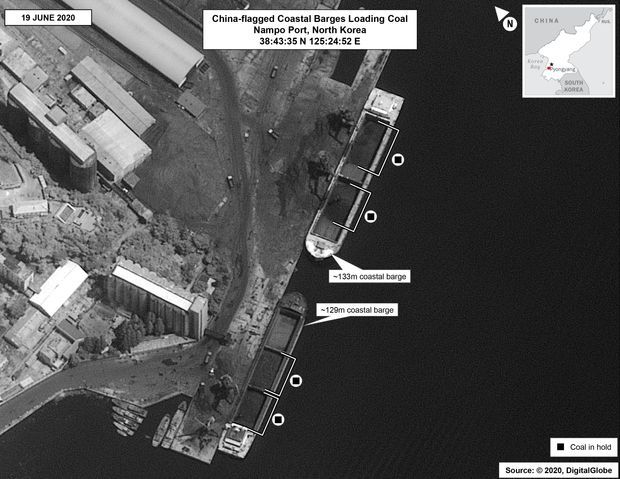 |
This satellite photo shows a Chinese-flagged barge loading coal at North Korea’s Nampo port on June 19. (US Government) |
North Korea and China are no longer even trying to avoid international surveillance when trading coal illegally, the Wall Street Journal reported Monday.
Citing senior officials in the US State Department and satellite photos provided by the State Department, the US newspaper said North Korea-flagged vessels have lugged hundreds of coal shipments to China’s Ningbo-Zhoushan area over the past year.
North Korea, prohibited from exporting coal under United Nations sanctions since 2017, had sought to evade surveillance for years by using ship-to-ship transfers at sea, having foreign-flagged ships turn off their tracking beacons and taking circuitous routes to avoid detection.
A satellite photo taken Aug. 12 and provided by the US State Department to the newspaper shows multiple coal vessels bearing the North Korean flag near Ningbo-Zhoushan, China, where most of North Korea’s coal is transferred to Chinese ships.
A June 19 satellite photo shows a Chinese-flagged barge loading coal at North Korea’s Nampo port.
“It is not particularly disguised or hidden,” a senior State Department official was quoted as saying by the US daily.
“The fact that China is making it easier on them makes it a much more reliable revenue stream than they’ve had.”
In previous years, North Korea had its coal vessels secretly move to the Gulf of Tonkin between China and Vietnam for ship-to-ship transfers there.
By skipping all this, North Korea is believed to have saved costs and increased export volumes.
Citing US government estimates, the WSJ said North Korea exported 4.1 million tons of coal between January and September this year.
This is about a fifth of what North Korea sold over a similar period before the 2017 UNSC resolution, and its coal exports have grown significantly since the UN ban, with deals being brokered by individuals linked to Pyongyang’s munitions industry, a US official was quoted as saying by the WSJ.
Assuming the coal sold for $80 to $100 a ton in 2020, the newspaper said the value of North Korea exports would range between $330 million and $410 million, a significant revenue given Pyongyang’s decision to cut cross-border trade with China in a bid to fend off COVID-19.
In addition, the US alleges that China hosts at least 20,000 North Korean laborers who send their earnings home, and that Chinese companies have breached sanctions by trading with Pyongyang in a range of goods including seafood and machinery, according to the WSJ.
“I think China is concerned about stability in North Korea,” Joseph DeTrani, a former US intelligence official who served as the US special envoy to the six-party talks on North Korea’s nuclear program from 2003 to 2006, was quoted as saying to the WSJ.
“Beijing is saying, ‘Let’s see if we can ease up on Kim Jong-un and North Korea by giving them some economic viability until there is re-engaging with the US and some progress toward resolution of the nuclear issues.”
The illicit trade between China and North Korea presents a challenge for the incoming Biden administration.
By Kim So-hyun (
sophie@heraldcorp.com)







![[Today’s K-pop] Blackpink’s Jennie, Lisa invited to Coachella as solo acts](http://res.heraldm.com/phpwas/restmb_idxmake.php?idx=644&simg=/content/image/2024/11/21/20241121050099_0.jpg)
